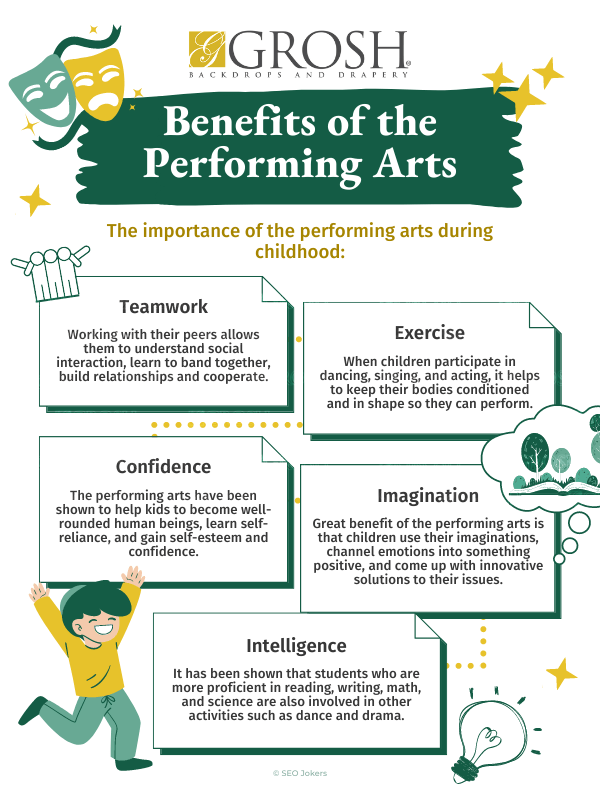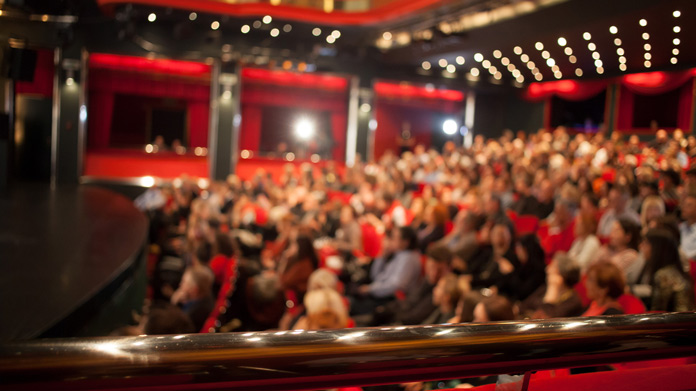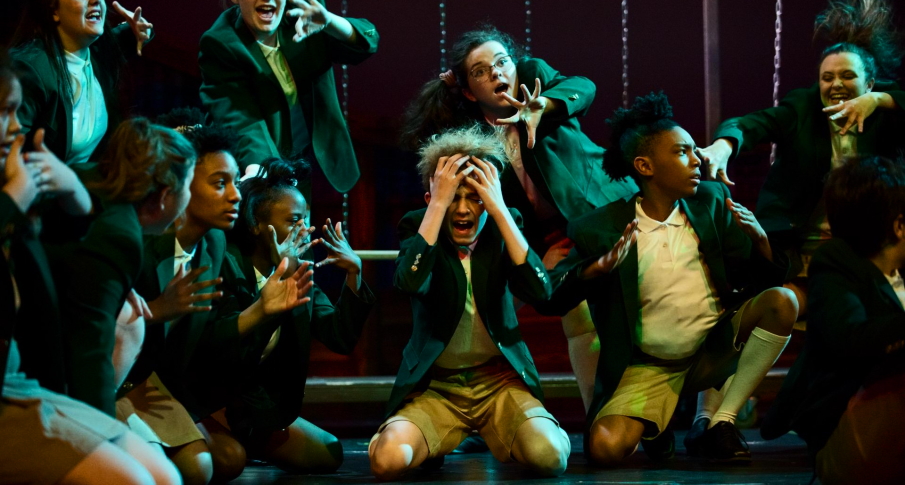Performing arts, such as theater, music, and dance, have long been celebrated for their ability to entertain and captivate audiences. But did you know that these art forms also have numerous benefits for students? From boosting confidence to enhancing creativity, the performing arts offer a wealth of advantages that extend far beyond the stage. So, how exactly does participating in the performing arts benefit students? Let’s explore!
First and foremost, engaging in the performing arts can greatly boost a student’s confidence. Whether it’s stepping onto a stage or performing in front of an audience, the act of showcasing their talents can help students develop a strong sense of self-assurance. This newfound confidence often spills over into other areas of their lives, empowering them to take risks, speak up, and face challenges head-on. Additionally, the performing arts provide a supportive and collaborative environment, allowing students to form connections with fellow performers and build a sense of belonging. This sense of community fosters a positive mindset and encourages students to embrace their unique abilities.
Moreover, participating in the performing arts nurtures and enhances students’ creativity. Through acting, singing, or dancing, students are encouraged to think outside the box, explore different perspectives, and express themselves in unique ways. The performing arts provide a creative outlet that allows students to tap into their imagination and experiment with various forms of self-expression. This not only fuels their artistic growth but also fosters critical thinking skills, problem-solving abilities, and the ability to adapt to new situations. By immersing themselves in the world of performing arts, students develop a lifelong appreciation for creativity and the arts, enriching their overall educational experience.
In conclusion, the performing arts offer a multitude of benefits for students, ranging from boosting confidence to enhancing creativity. By stepping onto the stage and participating in theater, music, or dance, students can develop valuable skills that will benefit them both academically and personally. So, why not encourage students to embrace the performing arts and unlock their full potential? After all, the stage is not only a place to entertain but also a platform for growth, self-discovery, and endless possibilities.

How Does Performing Arts Benefit Students?
Performing arts, including theater, dance, and music, offer numerous benefits to students. Engaging in these artistic activities not only allows students to express themselves creatively but also enhances their cognitive, emotional, and social development. By participating in performing arts, students can develop valuable skills and qualities that will benefit them throughout their lives. Let’s explore the various ways in which performing arts can positively impact students.
Enhancing Cognitive Skills
Participating in performing arts requires students to engage in complex mental processes, such as memorization, problem-solving, and critical thinking. Whether it’s learning lines for a play, choreographing a dance routine, or practicing a musical instrument, students must exercise their memory and cognitive abilities. These activities stimulate the brain and improve memory retention, concentration, and attention to detail.
Furthermore, performing arts provide opportunities for students to think creatively and develop innovative solutions. They learn to analyze situations from different perspectives and think outside the box. These skills can be transferred to various academic subjects and real-life scenarios, helping students become more adaptable and resourceful individuals.
Improved Emotional Well-being
Engaging in performing arts can have a profound impact on students’ emotional well-being. Acting, dancing, or playing a musical instrument allows students to express their emotions in a safe and constructive manner. They can explore different characters, emotions, and themes, which helps them develop empathy and emotional intelligence.
Performing arts also provide a platform for self-expression and self-discovery. Students can gain a better understanding of their own thoughts, feelings, and identities through the creative process. This self-awareness promotes personal growth and boosts self-confidence, as students gain a sense of achievement and pride in their artistic accomplishments.
In addition, performing arts often involve collaboration and teamwork, which fosters positive relationships and a sense of belonging. Students learn to work together, respect each other’s ideas, and support one another. This social interaction within the performing arts community can contribute to a greater sense of happiness and fulfillment.
Developing Social Skills
Participating in performing arts provides students with numerous opportunities to develop and refine their social skills. Whether it’s performing in front of an audience, working with a cast or ensemble, or collaborating with directors and instructors, students learn to communicate effectively and interact with others.
Performing arts encourage students to become effective communicators, as they must convey emotions, ideas, and messages through their performances. They learn to use their voice, body language, and facial expressions to express themselves clearly and effectively. These communication skills can be valuable in various personal and professional contexts.
Furthermore, performing arts foster a sense of community and create a supportive environment where students can connect with like-minded individuals who share their passion for the arts. This sense of belonging and camaraderie can help students develop strong friendships and support networks.
Improved Academic Performance
Engaging in performing arts has been linked to improved academic performance. Studies have shown that students involved in performing arts often demonstrate higher levels of achievement in other subjects, such as math, science, and language arts. This may be because performing arts activities stimulate various areas of the brain, promoting overall cognitive development.
Furthermore, participating in performing arts can enhance students’ focus, discipline, and time management skills. Rehearsing for performances requires commitment, perseverance, and the ability to manage one’s time effectively. These qualities can translate into better study habits and academic success.
Enhanced Cultural Appreciation
Performing arts expose students to different cultures, traditions, and perspectives. Through plays, dances, and music from various cultures and time periods, students gain a deeper understanding and appreciation of the diversity and richness of the world around them.
By exploring different artistic forms, students develop cultural sensitivity and empathy towards others. They learn to embrace diversity, challenge stereotypes, and foster inclusivity. These experiences can contribute to the development of open-mindedness and tolerance, important qualities in an interconnected global society.
Increased Confidence and Self-esteem
Participating in performing arts can significantly boost students’ confidence and self-esteem. As they showcase their talents and skills through performances, students receive recognition and praise for their accomplishments. This positive feedback helps build confidence and a sense of self-worth.
Additionally, performing arts provide opportunities for students to overcome challenges, such as stage fright or mastering difficult dance sequences. As they conquer these obstacles, students develop a sense of resilience and belief in their abilities. This newfound confidence can positively impact other areas of their lives, empowering them to take on new challenges and pursue their goals.
In conclusion, participating in performing arts offers numerous benefits to students. From enhancing cognitive skills and emotional well-being to developing social skills and cultural appreciation, the performing arts provide a holistic learning experience. By engaging in these artistic activities, students can develop valuable skills and qualities that will serve them well in their personal and academic lives. So, whether it’s through acting, dancing, or playing an instrument, students should be encouraged to embrace the performing arts and reap the many rewards they offer.
Key Takeaways: How Does Performing Arts Benefit Students?
- Improved confidence: Performing arts help students build self-esteem and develop a sense of self-assurance.
- Enhanced creativity: Engaging in performing arts nurtures imagination and encourages innovative thinking.
- Effective communication skills: Students learn to express themselves clearly and effectively through various forms of artistic expression.
- Increased empathy: Performing arts promote understanding and empathy towards others, fostering a more compassionate mindset.
- Teamwork and collaboration: Students work together towards a common goal, developing valuable teamwork and collaboration skills.
Frequently Asked Questions
What are the benefits of performing arts for students?
Performing arts offer a wide range of benefits for students. Firstly, participating in performing arts activities helps to boost self-confidence and self-esteem. Through performing on stage, students learn to overcome stage fright and gain a sense of accomplishment, which in turn enhances their overall confidence. Additionally, performing arts allow students to express themselves creatively, enabling them to develop their own unique voice and identity.
Furthermore, engaging in performing arts activities enhances students’ communication and social skills. Whether it’s working together as part of a team in a theater production or collaborating with others in a dance routine, students learn the importance of effective communication, cooperation, and teamwork. These skills are not only valuable on stage but also in various other aspects of their lives, such as school projects, relationships, and future careers.
How does performing arts benefit students academically?
Participating in performing arts can have a positive impact on students’ academic performance. Research has shown that students involved in the performing arts tend to have higher academic achievement compared to their peers. This could be attributed to the various cognitive skills developed through performing arts, such as problem-solving, critical thinking, and creativity.
Moreover, engaging in performing arts encourages students to develop discipline and time management skills. Rehearsing for a play or practicing a dance routine requires dedication and commitment, which translates into improved organizational skills and the ability to prioritize tasks. These skills can be transferred to other academic subjects, helping students excel in their studies.
Do performing arts activities help with emotional well-being?
Yes, participating in performing arts activities can have a positive impact on students’ emotional well-being. Performing arts provide a creative outlet for students to express their emotions and cope with stress or anxiety. Whether it’s through acting, dancing, or singing, students can channel their feelings into their performances, allowing for emotional release and catharsis.
Furthermore, engaging in performing arts can help students develop resilience and emotional intelligence. By exploring different characters and situations, students gain a deeper understanding of human emotions and empathy. This increased emotional intelligence can lead to better self-awareness, improved relationships, and enhanced overall well-being.
Can performing arts improve students’ confidence?
Absolutely! Participating in performing arts can greatly improve students’ confidence levels. When students step onto the stage and perform in front of an audience, they gradually overcome their stage fright and gain self-assurance. The positive feedback and recognition they receive from their performances further boost their confidence and self-esteem.
Additionally, performing arts activities provide opportunities for students to set goals, work towards them, and achieve success. Whether it’s mastering a challenging dance routine or delivering a powerful monologue, these accomplishments contribute to a sense of pride and belief in one’s abilities. This newfound confidence can extend beyond the stage and positively impact other areas of students’ lives.
How do performing arts enhance students’ creativity?
Engaging in performing arts nurtures and enhances students’ creativity. Through acting, dancing, or playing a musical instrument, students are encouraged to think outside the box and explore their imagination. They learn to take risks, experiment with different ideas, and express themselves in unique ways.
Performing arts also foster a sense of playfulness and spontaneity, allowing students to tap into their creative potential. In improvisation exercises or choreography sessions, students are encouraged to think on their feet and respond intuitively, promoting creative thinking and problem-solving skills.
Furthermore, exposure to different forms of performing arts, such as theater, dance, and music, exposes students to a variety of artistic styles and perspectives. This exposure broadens their horizons and inspires them to think creatively in all aspects of their lives.

Creativity and Curiosity – The Benefits of Performing Arts | Penny Jin | TEDxSMICSchool
Final Summary: How Performing Arts Works Wonders for Students
At the end of the day, it’s clear that participating in performing arts has immense benefits for students. It goes beyond just entertainment or a creative outlet; it nurtures valuable skills and qualities that will serve them well in various aspects of life. From fostering self-expression and boosting confidence to developing teamwork and enhancing communication skills, performing arts truly works wonders for students.
When students engage in activities like theater, dance, or music, they are encouraged to step out of their comfort zones and explore different facets of their personalities. This not only allows them to express themselves freely but also helps them build self-confidence and overcome stage fright. The process of preparing for a performance, whether it’s memorizing lines, perfecting dance moves, or mastering musical techniques, teaches students discipline, perseverance, and resilience. These qualities are invaluable and can be applied to any area of their lives.
Furthermore, participating in performing arts also cultivates collaboration and teamwork. Students learn how to work together harmoniously, respecting and supporting one another’s contributions. Through group rehearsals, performances, and shared experiences, they develop a sense of camaraderie and learn the importance of effective communication and cooperation. These skills are essential not just in the arts but also in academic settings, careers, and personal relationships.
In conclusion, the benefits of performing arts for students are multifaceted and far-reaching. It enhances creativity, boosts confidence, promotes discipline, and fosters teamwork. By engaging in performing arts, students develop a well-rounded set of skills and qualities that will benefit them throughout their lives. So, whether it’s singing, dancing, acting, or playing an instrument, let’s encourage our students to embrace the performing arts and unlock their full potential.




